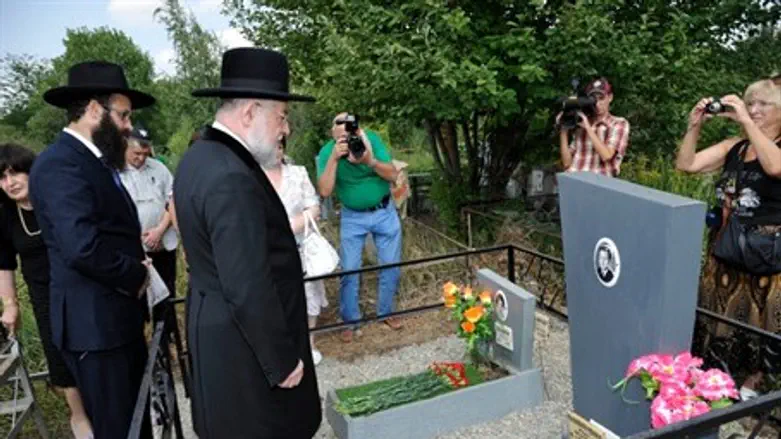
Former Israel Chief Rabbi Yisrael Meir Lau joined Rostov's Chabad-Lubavitch emissary, Rabbi Chaim Danzinger, in leading a march on Sunday to mark the 70th anniversary of a tragic massacre.
The Zmievskaya Balka massacre was a forced march of 27,000 Jews in Rostov, Russia, including women and children, as well as many Soviet citizens. On August 11-12, 1942, the victims were marched to a ravine at the edge of the city, and there they all were murdered.
This year, some 500 Jews – many wearing armbands bearing the Star of David – marched on Rostov-on-Don to honor the memories of the dead, accompanied by a police escort.
Nearly half of the marchers later came to hear Rabbi Lau speak. “He inspired listeners to become involved and engaged in Jewish life,” said Rabbi Danzinger.
The “Soldatski Synagogue” (Soldiers' Shul) where he spoke, noted Rabbi Lau, was built by Jewish soldiers who were forcibly taken away from their homes at the age of 10 to serve the Czar, and remained in his service for about 25 years.
"If after serving for 25 years they were able to build a shul and continue Jewish traditions, imagine the responsibility we have to keep Jewish traditions alive, ensure our children a Jewish education, a brit, a bar mitzvah, kosher observance and Jewish marriages,” Rabbi Danzinger said.
Rostov residents and family members of those murdered are not new to the march; they mark the tragedy with a memorial each year, according to the Lubavitch News Service. But this year a special march was held, and led jointly by Rabbi Lau, currently the Chief Rabbi of Tel Aviv, together with Rostov's Rabbi Danzinger.
To Rabbi Lau, the story of tragedy, survival and renewal is a recurrent theme; the rabbi is a Holocaust survivor who managed to live, despite his tender age of five when grabbed by the Nazis.
"In one of the rooms where Jews were tortured in Buchenwald,” he recalled, “a Jew scraped the word 'revenge' into the wall. What does it mean? Are we going to fight? Will we wage war? Our revenge is to live and follow the Jewish traditions and to give birth to Jewish people,” he explained.
When he reached the memorial site, Rabbi Lau recited the Kaddish and the Kel Maleh Rachamim prayer for the dead.
Prior to the march, last Friday, he visited the burial place of Feodore Mikhailichenko, the Gentile man who took the little Jewish boy under his wing in the Buchenwald death camp, and saved his life.